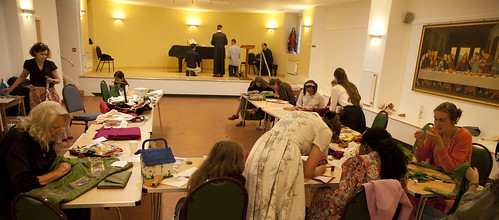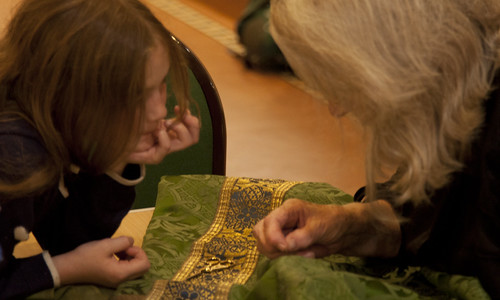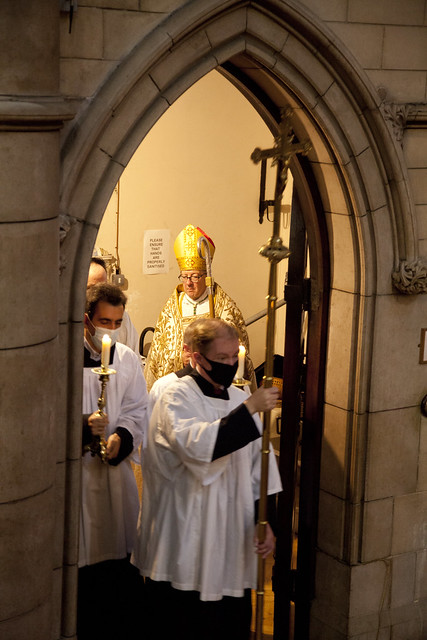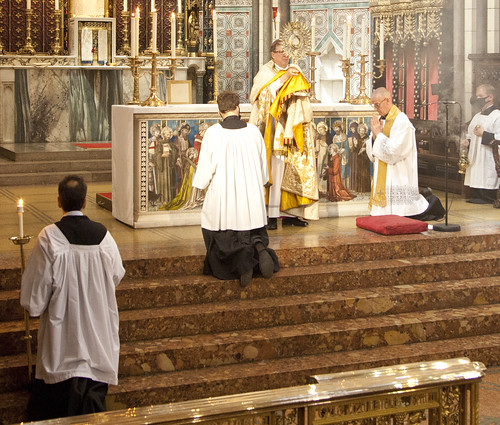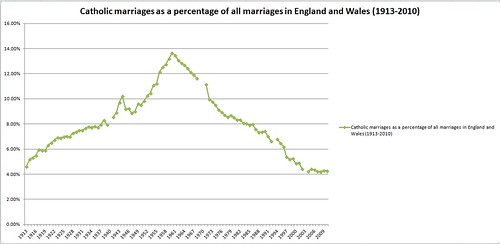Chairman's Blog
Traditionis Custodes: a disaster for interreligious dialogue and ecumenism
If [Fr Thomas] Reese [on NCR] is concerned about ecumenism and interreligious dialogue, then he is faced with a different kind of problem. Traditionis Custodes has set the Church’s relations with other religions back fifty years, and it is difficult to see how they will recover.
On interreligious dialogue, defined as discussions aimed at greater mutual understanding between the Church and non-Christian religions, the Apostolic Letter and the polemic being produced by Fr. Reese and others in its support is saying that a genuine engagement of the religious instinct is impossible through worship in a sacred language, using chant, complex ceremonies, elaborate vestments, and so on. That, as they say, is a point of view. But it is a point of view incompatible with taking seriously the search for God represented by Islam, Judaism, Hinduism, Buddhism, the Jain religion, Shamanic religions, and indeed practically any non-Christian religion you could mention. Sacred languages are found in all the major non-Christian religions — Hebrew, Sanskrit, and Classical Arabic most obviously — and sacred music, ritual, and clothing, in practically all of them.
How are Catholic interreligious dialoguers going to face their non-Christian friends the next time they meet? “It okay”, they might say. “It is only our own traditions which we fear and loath: We think yours are wonderful!” How credible is this going to be?
Keep calm and carry on: Server Training and Vestment Mending with the Latin Mass Society yesterday
The Society of St Tarcisius Server Training was also attended by a number of new people, and we enrolled a new member, who had come all the way from Bournemouth to polish up his skills. Like all members of the Society of St Tarcisius, he committed himself to serving the Altar with 'fervour, devotion, attention, and exactness.'
The Guild and the Society of St Tarcisius are both affilitated to the Latin Mass Society and their events can be found on the LMS website, and on their own: Tarcisius, Guild of St Clare. No previous experience is required for participation in the events of either! And people of all ages are welcome (children to be accompanied by an adult of course).
Their next joint event is
25th September: St James' Spanish Place, London
For the Society of St Tarcisius please see the booking page
LMS: Confirmations in London
The day after the publication of Traditionis Custodes, the Latin Mass Society-organised Confirmation service took place in St James', Spanish Place, in the Archdiocese of Westminster. For many years now--since before Summorum Pontificum, in fact--they have been providing an auxiliary bishop to give the Sacrament of Confirmation to people all over the country, and beyond. The Latin Mass Society advertises it, does the paper-work, and pays the (excellent) parish choir, so that Catholics attached to the older liturgy can receive this sacrament in that form in union with the bishops.
Thanks to Covid, the service, which usually takes place in November, did not happen in 2020, so this was a 'catch-up' one, and was smaller than usual. (This made the remaining Covid measures a lot easier to apply.) If there is demand, we'll try to organise another at the usual time of year as well.
We are very grateful to Bishop John Sherrington, who conferred the sacrament, to the parish, to the choir, and to our staff and volunteers.
Traditiones Custodes: unity vs. uniformity
In his Letter to Bishops accompanying his Apostolic Letter Traditionis Custodes, among many things worthy of comment Pope Francis says that Pope Paul VI:
“declared that the revision of the Roman Missal, carried out in the light of ancient liturgical sources, had the goal of permitting the Church to raise up, in the variety of languages, ‘a single and identical prayer,’ that expressed her unity. This unity I intend to re-establish throughout the Church of the Roman Rite.”
This is a puzzling statement. First, “the Church of the Roman Rite” has many other liturgical books besides the standard edition of the Roman Rite. Second, the standard Roman Missal contains an enormous number of options, and hardly seems to be aiming at uniformity of prayer in the sense which seems to be intended in Pope Francis’ new letter. Third, the Second Vatican Council and the subsequent Papal Magisterium teach that liturgical uniformity is not necessary to the unity of the Church, but rather that the latter is best expressed in liturgical diversity.
Canonical guidance on Traditionis Custodes from the Latin Mass Society
 |
| The 1962 Mass in the Chapel of the Throne, in St Peter's Basilica, Rome, celebrated by Bishop Rey of Frejus, France, for the Summorum Pontificum Pilgrimage 2019. |
*Traditionis Custodes does not abrogate the 1962 Missal (otherwise it could not allow it to be said in certain circumstances).
* It follows that it is not the right of priests to celebrate it that is at issue--this remains intact--but the public exercise of this right, which is a matter of regulation by the local bishop.* The right of priests to celebrate privately, to say the older Office, to celebrate the other sacraments, to use the older Rituale: all these are unrestricted by Traditionis Custodes.* The restrictions mentioned in Article 3, notably on the use of parish churches, only apply in the case of 'authorised' 'groups', such as came into existence in the course of the formal application of Summorum Pontificum, or are served by a 'personal parish'.* Although preists need permission from the bishop to celebrate the 1962 Missal, with this permission, and outside the context of a formalised 'group', he may do so without the restrictions of Art 3: for example, in a parish church.
*It would also follow that there need be no difficulty allowing the 1962 Missal to be used for special occasions such as pilgrimages.
Fr Thomas Reese on Traditionis Custodes: fisked
(Cross-posted from Rorate Caeli)
Fr Reese's column is here. My comments in red.
Despite the recent decision of Pope Francis to curtail celebration of the Latin Mass, we are not going to see it disappear anytime soon for a simple reason: Local bishops can and will still permit it.
This is true
Francis' new rules on the old liturgy were laid out in Traditionis Custodes on July 16.
Unlike his predecessor, Pope Emeritus Benedict XVI, Francis is no fan of the pre-Vatican II liturgy. Like Pope Paul VI and most people in the church, Francis welcomed the liturgical reforms enacted by the Second Vatican Council (1962-1965) and believed the old liturgy would gradually fade away as Catholics who were raised with it died off.
Would ‘most people in the Church’ include the 50% or so who stopped going to church? Statistics of church attendance are unreliable but here’s something easy to count: marriage.
In 1981, a survey of bishops by the Congregation for the Sacraments and Divine Worship found that only 1.5% of the bishops said their priests and people were in favor of making greater allowance for the Tridentine rite, as the old, pre-conciliar Latin Mass is called. (The post-conciliar version approved by Paul VI was written in Latin but then translated into the vernacular for common use around the world.)
What does this show? That only 1.5% of bishops thought seriously about the pastoral care of the Catholics attached to the Traditional Mass in their dioceses. Not quite as flattering to Fr Reese’s case as he imagines.
Benedict, though, had experienced great spiritual nourishment in the old liturgy and hoped that allowing its greater use would foster church unity, especially with those who found change difficult. But he also wanted to provide the old liturgy to those young people who were attracted to it.
I hope all the prelates of Pope Benedict’s generation experienced this nourishment, otherwise they would hardly have become priests in the first place.
When local bishops were reluctant to allow widespread use of the old liturgy, Benedict sidelined them, giving every priest the right to celebrate the old Latin rite even if his bishop opposed it.
Benedict also went a step further. He declared that the new and old liturgies were of equal standing in the church. Thus, there was no need for the old liturgy to fade away as anticipated by Paul VI.
Benedict's hope to foster unity failed. Those who went into schism because of the council, like the Society of St. Pius X, would not come back simply because they were allowed to say the old Mass. They are still in schism despite the efforts of Paul VI, John Paul II, Benedict XVI and Francis.
This is not true: a significant number of priests returned to unity under the Pope, having been in or associated with the SSPX until 2007. In the UK we have the Sons of the Most Holy Redeemer; in Germany the Institute of St Philip Neri in Berlin; in France the Institute of the Good Shepherd, all from the Summorum Pontificum era. A previous set of priests were reconciled under Ecclesia Dei Adflicta,notably the Fraternity of St Peter and a number of French religious communities. The ‘sunshine policy’ worked.
There are others who remain in the church but who champion the Latin Mass as a symbol of their rejection of all the reforms that came from the Second Vatican Council. These ideologues argue that the new Mass is an abomination, that ecumenism is a betrayal of tradition and interreligious dialogue is satanic. They believe that only they are the true church and everyone else is in error.
I challenge Fr Reese to give one single example of a figure of any significance associated with the Traditional Mass under Summorum Pontificum who uses this language. On the contrary, it should be obvious that ecumenism and interreligious dialogue will be impossible under Tradionis Custodes. How’s it going to work? ‘We really appreciate and respect your (Hindu, Buddhist, Muslim, Orthodox) use of sacred languages not understood by the worshipper, your tradition of chant, your penitential practices: we just fear and loath our own! Oh, and you Protestants: the Pope doesn’t exercise despotic power, that’s a misunderstanding. Just give me a moment while I crush these trads under my booted heel…’
By bolstering these dissidents, Benedict's efforts for church unity backfired. This view was confirmed by a detailed consultation with the world's bishops by the Congregation for the Doctrine of the Faith.
Except that it wasn’t. Everyone who has actually seen the results confirms that they were mixed, with many bishops pleased with the results of Summorum Pontificum. The one piece of direct evidence in the public domain, the French bishops’ summary, is quite negative but still accepts the Traditional Mass as a fact of life. Their response to Traditionis Custodes has been to reassure Traditional Catholics of their ‘esteem’. They are perfectly aware of where the threat to the unity of the Church comes from.
Those who went into schism because of the council, like the Society of St. Pius X, would not come back simply because they were allowed to say the old Mass. They are still in schism despite the efforts of Paul VI, John Paul II, Benedict XVI and Francis.
You’ve done this bit. Don’t they have editors at NCR?
Congregations that celebrate the old Mass today have become rallying centers for those fomenting opposition not only to the council reforms but to Francis' papacy. Not only do they oppose the reforms, they also spread their dissent to those who simply come to find spiritual nourishment in the old liturgy.
No, they have become decompression chambers for people traumatised by the crisis in the Church, where they can calm down, remain in the unity of the Church, and receive pastoral care and the sacraments.
The challenge that Francis now faces is how to separate the pious faithful with traditional devotion to the old liturgy from the ideologues who reject the reforms of the council.
His solution is to empower local bishops with the authority to separate the sheep from the goats. He has returned to bishops their traditional authority over the liturgy that is celebrated in their dioceses, the same authority they had under John Paul II. The bishops can still allow the celebration of the old Mass where they judge there is a pastoral need, but they can deny it to dissenters who oppose the reforms of Vatican II.
Since, on Reese’s view, they are mixed together like the tares and the wheat, how exactly is that going to work? Are they going to be interrogated? Is a diocesan official going to take screen-shots of their social media postings?
The bishop can also control which priests are celebrating the old Mass to make sure that they are fostering unity with the church rather than dissent. According to Francis, these priests should be "animated by a lively pastoral charity and a sense of ecclesial communion."
However, Francis does reserve to the Vatican permission for newly ordained priests to celebrate the old liturgy. He worries about young priests and seminarians who only want to celebrate the old liturgy. He wants to make sure that they understand that they are being ordained for the whole church, not just a small faction within it.
Here is an interesting admission that of the many vocations prompted by the Traditional Mass, a goodly portion do not go to the exclusively Traditional Institutes and communities. If Reese wants priests who celebrate both Forms, he should rejoice that these young men are joining their diocesan seminaries to learn how to celebrate the Novus Ordo.
Likewise, he has told bishops not to authorize new parishes or new groups for the sole use of the old Mass.
Francis has also reversed Benedict's decision to give equal standing in the church to the pre- and post-Vatican II liturgies. According to Francis, the new liturgy is the only liturgy of the church, and the old liturgy is only allowed temporarily for pastoral reasons.
But that’s a contradiction, isn’t it? How can the Novus Ordo be the ‘only liturgy’ and at the same time there is another one, albeit allowed only temporarily? If it’s being said with the permission of the Pope and the Bishops, it is legitimate. And what about all the other Rites and Usages? Are the Carthusians going into schism? And the Greek Catholics?
Francis has also mandated that the Scriptures at these Masses be read in the vernacular, not Latin. Perhaps he hopes to gradually introduce the vernacular into these liturgies in the future.
What he has mandated has commonly been done for a century or more: the reading of the lections in the vernacular after their proclamation in Latin.
In any case, once again, it is the official position of the church that the old liturgy should fade away.
Will it fade away? Not quickly.
Many bishops have already announced that there will be no immediate change in their dioceses. This is smart. Pastoral practice demands that the bishop have a dialogue with their communities before making any decision. Those who are spiritually attached to the old liturgy should be treated with compassionate sensitivity and separated from those who foment rebellion.
If they examined Catholics attending the Novus Ordo on their orthodoxy, they'd have to decide what to do with the 70% (yes you read that correctly) who don't believe in the Real Presence. I'd be fascinated to know what Novus Ordo Catholics believe about the authority of the Pope, or the binding nature of Vatican II.
Those who are young must be educated to the deeper meaning of the Eucharistic reforms and encouraged to go to the new liturgy. They need to understand the communal and participatory aspects of liturgy. We come together not simply for our individual devotion but to worship as a community of disciples who are called to help establish God's kingdom on earth.
Whereas in the Traditional Mass we come together with the saints of all the ages and Catholics all over the world to offer to the Father one and the same sacrifice of Christ on the Cross, using the very same words. Even Annibale Bugnini, the architect of the Novus Ordo, conceded that those who objected to his reforms did so, in part, precisely because of the lack of unity it presented. Pope John Paul II made the same point. Dominicae Cenae (1980) 80:
Nevertheless, there are also those people who, having been educated on the basis of the old liturgy in Latin, experience the lack of this “one language,” which in all the world was an expression of the unity of the Church and through its dignified character elicited a profound sense of the Eucharistic Mystery
Local bishops can also point out that saying the Mass in Latin is not a problem if it is the Latin version of the new rite. It is the old liturgy that is used to breed disunion.
But we all know that priests who have tried to offer the Novus Ordo in Latin have been subject to official disapproval and even persecution, sometimes more severe than that meted out to Traditionalists. The Latin Novus Ordo has been effectively banned from St Peter’s, even while the EF was given a tiny space in which to continue. In many places no Latin is taught in seminaries, and now we’ve been told that the Latin edition of the Novus Ordo Missal will not be reprinted. How are these Masses going to be celebrated, Fr Reese, without a Missal?
The need for pastoral sensitivity means that it will take time for old liturgy to fade away, but this ultimately is the goal.
When my mother was alive, she used to go to the Saturday evening Mass at her parish. One Saturday she showed up and the Mass was in Spanish. She kept going to that Mass even though she did not know a word of Spanish. When I asked her why, she responded, "It is wonderful, just like the old Latin Mass. I don't understand a word they are saying." Then she added, "It is even better, I don't understand the homily."
Fr Reese would do well to reflect on the meaning of this anecdote, and not just use it as a gag-line. It tells us something about the suffering of Catholics under liturgical abuses and the preaching of novelties and nonsense from the pulpit, and the possibility of spiritual participation in the Mass.
Thomas Reese
Jesuit Fr. Thomas Reese's column for Religion News Service, "Signs of the Times," appears regularly at National Catholic Reporter.
Traditionis Custodes and Families
The practical effects of Pope Francis’ new Apostolic Letter will no doubt vary from place to place, but one thing is clear: at the highest level, the pastoral solicitude of Pope John Paul II and above all of Pope Benedict XVI, towards Catholics attached to the ancient liturgical tradition, has been replaced at the highest level of the Church by an attitude of suspicion, and even of hostility.
I started attending the Traditional Mass in 2002, and so I had a taste of life before Pope Benedict. Ordinary Catholics, even quite conservative ones, would literally recoil in horror when they heard that I was attending the ancient Mass, regardless of the fact that it had the approval of the local bishop and was celebrated by a priest in good standing in the Church. Ferocious attacks on us appeared in mainstream and, again, conservative Catholic publications. This continued for some time even after 2007, but as time has worn on it has become less and less of a problem.
Marian Franciscan Vocations retreat, August
Who is Pope Francis punishing?
In his Apostolic Letter Traditionis Custodes and its covering letter, Pope Francis is introducing stringent new restrictions on the celebration of the ancient Latin Mass, now called not the Extraordinary Form but simply the 1962 Missal or “earlier Missal.”
Pope Francis writes, in the letter, that the use of the 1962 Missal is
often characterized by a rejection not only of the liturgical reform, but of the Vatican Council II itself, claiming, with unfounded and unsustainable assertions, that it betrayed the Tradition and the “true Church”.
Pope Francis indicates that this concern, and the desire for measures such as those he has adopted, has been expressed by bishops responding to the survey on the implementation of Summorum Pontificum which the Congregation for Divine Worship carried out in 2020. This is very surprising, since those who had sight of the results consistently reported that a great many bishops were positive about the place of the Old Mass in their diocese. Even the French bishops, whose rather negative collective response was leaked, had to acknowledge many positive aspects of the phenomenon, and concludes that “if it [Summorum Pontificum] honors a principle of reality, then a tireless work of unity is always necessary.” What the French bishops had in mind, to assist this “work of unity,” was things like reconciling the calendar and lectionary, issues which Pope Francis has not broached.
Read the whole things there.
Some Comments on the Apostolic Letter Traditionis Custodes
This has already gone out by email to LMS supporters.
This document will be a grave disappointment to those many priests and lay Catholics who responded to the words of Pope St John Paul II and Pope Benedict XVI, who encouraged the use of the earlier liturgical tradition, calling it a ‘rightful aspiration’ and ‘riches’ for the Church, respectively. These Catholics have worked hard over many years, particularly since 2007, to build up the unity of the Church, which as the Second Vatican Council declared does not depend on liturgical uniformity but on unity of faith under the Pope (Sacrosanctum Concilium 37; Orientalium Ecclesiarum 2).
The provision that the EF not be celebrated in parish churches appears entirely unworkable, in the context of the careful provision which has been made over many years by bishops all over the world.
The overall negative judgement of the EF and the communities which attend it seems wholly unwarranted, and we would challenge any apologist for this document to produce real evidence that the EF has undermined the unity of the Church, compared, say, to the celebration of Eastern Rites in the West, the special liturgical celebrations of the Neocatechumenate, or the great variety of liturgical styles found in the context of the Ordinary Form of the Roman Rite.
In detail, looking at the provisions of the document:
Art 1: This appears to overturn Pope Benedict XVI’s claim that the Roman Rite can be considered as having two ‘Forms’, Ordinary and Extraordinary. The document adopts the terminology of ‘the 1962 Missal’.
Art 2: This rolls back the presumption of authorisation for the 1962 Missal which was created by Summorum Pontificum in 2007. However, that claim was based on the fact that the older Missal had never been abrogated. Since this document does not formally abrogate it, this creates a legal anomaly.
Art 3.1: the insistence that groups attending EF accept, in some sense, the ‘validity and legitimacy’ of the reformed Mass is reminiscent of earlier documents (e.g. the Indult of 1984). This seems no more than an empty gesture, however, since now as formerly it is impossible to know how bishops would go about enforcing this.
Art 3.2: in practice bishops all over the world have, on their own initiative or by approving the initiative of their priests, designated where the old Mass can be celebrated. The insistence that these places not be parish churches, and that they not erect any further personal parishes, would seem to present bishops with an unnecessary problem.
Many parishes contain ‘chapels of ease’, the oratories of religious communities, and other places of worship, as well as parish churches, but it is obscure what advantage would be had, from any point of view, in transferring celebrations of the 1962 Missal to such locations.
Art 3.3: similarly, bishops have already in practice ‘designated’ when the 1962 Missal is celebrated, as they know about, and at least by implication permit, all the public celebrations of Mass in their dioceses. It should also be noted that the Epistle and Gospel are commonly read in the vernacular at 1962 celebrations, and that this document does not forbid them from being proclaimed in Latin as well, which is what normally happens.
Art 3.4, Art 5: these re-establish the system in place before 2007 when bishops had to permit priests to celebrate the 1962 Missal. Once again, however, bishops today know and by implication permit their priests to do this, since they assign them to parish ministry or to some other task in this knowledge. Expecting priests to apply for this permission (Art 5) again will be for many priests and bishops a pointless bureaucratic exercise.
Art 3.5: Bishops always have the power to regulate and, for sufficient reason, to close down, pastoral activities in their dioceses. What this, and many other provisions of this document, appear to establish, however, is a hermeneutic of suspicion towards the 1962 Missal and those who celebrate or attend it: almost, that they be regarded as guilty until proven innocent.
Art 3.6, Art 4: To remove the bishops’ power to establish new groups, and to permit newly ordained priests to celebrated the 1962 Mass, seems to contradict the document’s insistence on bishops’ authority and discretion.
Art 6 and 7: these effectively abolish the authority of the Congregation of the Doctrine of the Faith for matters connected with the 1962 Missal, which was reiterated only a short time ago when Pope Francis amalgamated the Pontificum Commission Ecclesia Dei with the CDF.
If implemented rigorously, this document will seriously disrupt long-established celebrations of the older Missal, and will drive a great many faithful Catholics, who desire nothing more than to attend the ancient Mass in communion with their bishops and the Holy Father, to attend celebrations which fall outside the structures of the Church, above all those of the Society of St Pius X.
Joseph Shaw, Chairman of the Latin Mass Society

